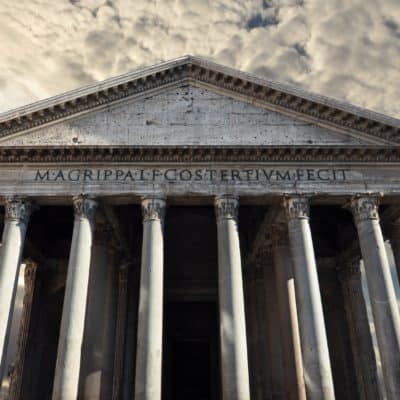Where does this concept of clean and unclean come from? Is it strictly ceremonial or practically applicable? Metaphorically, the concept of being cleansed is inseparable from Christianity. It is part of the plan of God from beginning to end.
All four of the gospel accounts talk about the baptism of John. Mark 1:2-5 says, “As it is written in the prophets, Behold, I send my messenger before thy face, which shall prepare thy way before thee. The voice of one crying in the wilderness, Prepare ye the way of the Lord, make his paths straight. John did baptize in the wilderness, and preach the baptism of repentance for the remission of sins. And there went out unto him all the land of Judaea, and they of Jerusalem, and were all baptized of him in the river of Jordan, confessing their sins.”
The need for true forgiveness from the Almighty was obvious. The sacrifices under the Levitical priesthood were themselves symbolic, a physical representation of the sinner’s remorse and commitment to doing better. The real reconciliation takes place on a spiritual level.
Consider the condition of the established religious system at this time. The Sadducees, who controlled the Temple, did not believe in the resurrection or angels (Acts 23:8), views contrary to scripture. Christ criticized the Pharisees by quoting Isaiah 29:13, “in vain they do worship me, teaching for doctrines the commandments of men.” They were obsessed with remaining personally, ceremonially clean. It became a self-righteous display contrary to the intent of God’s Law.
You can imagine, in this context, what a breath of fresh air the teachings of John the Baptist and Jesus Christ were! They caused a sensation; people flocked to them! The desire to be reconciled with God existed but the establishment, to coin a phrase, had virtually put the truth off limits. Christ said, “…Ye pay tithe of mint and anise and cummin, and have omitted the weightier matters of the law, judgment, mercy, and faith,” in Matthew 23:23.
The “weightier matters” all factor into reconciliation with God. You sin, breaking the law (1 John 3:4). You realize your error, judging yourself and seeking mercy in repentance (James 4:8-10). Faith allows you to continue life with a clean conscience, confident that God has forgiven you according to His Word (Isaiah 49:13). “Have I any pleasure at all that the wicked should die? saith the Lord God: and not that he should return from his ways, and live?” (Ezekiel 18:23)
That beautiful truth was being neglected, buried under pedantic rules about cups and steps. There was a yearning for real substance that had no clear path forward with the entrenched interests of the day. Yet the desire of everyday people to wash the past away and be clean in the eyes of God is evident. It is the same desire that leads people to Jesus Christ today and it is the same kind of self-interested posturing that can make the truth so hard to find among the 1000’s of competing “Christian” denominations that all claim to follow the same book.
Still, the idea of being clean or unclean was deeply rooted. The words appear over 200 times in the first 5 books of the Bible, particularly in Leviticus and Numbers. The implications are far more than ceremonial. Much of Leviticus 13, 14 and 15 address disease in these terms. There are very practical rules for preventing its spread. Touching the ill, their bed, clothes, etc., rendered one “unclean.” They were to wash their clothes and themselves, and stay away from others.
This type of uncleanness was not always avoidable. For instance, after touching a dead body you had to stay apart for 7 days (Numbers 19:11) but someone had to actually carry out the burial. Even a Priest could perform this duty for a close family member (Leviticus 21:2-3) though not the High Priest (verse 11). The rules were often more strict for those directly involved in the Temple service.
No one who was unclean for any reason was to partake of the sacrifices (Leviticus 7:20). This illustrates the regard we should have when approaching God. Consider the similarity to Paul’s admonition of the church in Corinth regarding how they were observing the Lord’s Supper.
“Wherefore whosoever shall eat this bread, and drink this cup of the Lord, unworthily, shall be guilty of the body and blood of the Lord. But let a man examine himself, and so let him eat of that bread, and drink of that cup. For he that eateth and drinketh unworthily, eateth and drinketh damnation to himself, not discerning the Lord’s body. For this cause many are weak and sickly among you, and many sleep. For if we would judge ourselves, we should not be judged” (1 Corinthians 11:27-31).
Context shows what he meant by “unworthily.” They were being contentious, gluttonous, and some were drunk, completely disregarding the somber occasion they were commemorating. Such disregard is not acceptable to God.
It brought about the untimely demise of Aaron’s sons, Nadab and Abihu. Afterwards the Lord commanded Aaron, “Do not drink wine nor strong drink, thou, nor thy sons with thee, when ye go into the tabernacle of the congregation, lest ye die: it shall be a statute for ever throughout your generations: And that ye may put difference between holy and unholy, and between unclean and clean;” (Leviticus 10:9-10).
You can see how the practical aspects of God’s judgments about clean and unclean merge with His expectations for our spiritual growth. The Pharisees overemphasized the physical aspect to their detriment. They lost much of the humility and contrition that are necessary when approaching God. It is also possible to err in the other direction.
Grace is unmerited pardon. It is a miracle that gives us a way out from under the death penalty we have all earned by breaking God’s laws. As such it rightly gets a lot of attention in the Christian world. The danger is in focusing so exclusively on one thing that it takes away from other important aspects of what Jesus Christ taught. We read how Paul handled the Corinthian church. They were Christians, going through the motions of following Jesus’ example.
While no doubt they had at some point repented and been baptized, that did not cover their current, negligent attitude. They had an ongoing responsibility to a certain standard of conduct and Paul reminded them of that in no uncertain terms. Grace was still available, and reconciliation desired, but it had to be God’s way or not at all. There is a balance to it. Are we as eager to please Him as He is to forgive us?
Isaiah 64:6-9 says, “But we are all as an unclean thing, and all our righteousnesses are as filthy rags; and we all do fade as a leaf; and our iniquities, like the wind, have taken us away. And there is none that calleth upon thy name, that stirreth up himself to take hold of thee: for thou hast hid thy face from us, and hast consumed us, because of our iniquities. But now, O Lord, thou art our father; we are the clay, and thou our potter; and we all are the work of thy hand. Be not wroth very sore, O Lord, neither remember iniquity for ever: behold, see, we beseech thee, we are all thy people.”
There is humility even in the desire to be righteous, a plea to be molded however it is pleasing to God. To continue the analogy, you could say that it’s necessary to refer to the instruction manual on how to properly use your clay pot. Important information like, is it microwave safe? What voids the warranty? You get the idea. The manufacturer usually knows how to get the best performance and longest life out of their product. That includes what not to do!
Obviously, the Bible is full of that kind of information from the Creator to the creation. Sometimes it is presented as a narrative with good or bad examples. Sometimes it is very direct, like the law and many of the statements by Christ and the apostles. Yet it is always encouraging the same results: reconciliation with God, peace among men, righteousness and its attendant blessings.
Look at the example of the Flood. Peter draws a comparison between baptism and that cataclysmic event. He actually references Noah in both of his letters, as well as a number of other scriptural examples that support his point.
“For Christ also hath once suffered for sins, the just for the unjust, that he might bring us to God, being put to death in the flesh, but quickened by the Spirit: By which also he went and preached unto the spirits in prison; Which sometime were disobedient, when once the longsuffering of God waited in the days of Noah, while the ark was a preparing, wherein few, that is, eight souls were saved by water. The like figure whereunto even baptism doth also now save us (not the putting away of the filth of the flesh, but the answer of a good conscience toward God,) by the resurrection of Jesus Christ: Who is gone into heaven, and is on the right hand of God; angels and authorities and powers being made subject unto him.” (1 Peter 3:18-22).
That’s the positive example, a comfort if we feel engulfed by the evil in the world. God can deliver you no matter what. He is above all. Consequently He is to be obeyed. Enter the negative example: “And spared not the old world, but saved Noah the eighth person, a preacher of righteousness, bringing in the flood upon the world of the ungodly; And turning the cities of Sodom and Gomorrha into ashes condemned them with an overthrow, making them an ensample unto those that after should live ungodly” (2 Peter 2:5-6).
God is longsuffering, but there is a limit to how much foolishness He will tolerate. Christ said they acted like nothing was wrong until it was too late (Matthew 24:38). Hadn’t they been warned? Peter called Noah a preacher of righteousness. Genesis 6:12 says, “And God looked upon the earth, and, behold, it was corrupt; for all flesh has corrupted his way upon the earth.”
It didn’t start out that way, it became corrupt, evil, unclean. That is what happens when you neglect or misinterpret the word of God. Error creeps in and multiplies, truth suffers. Incidentally, the story of Noah contains a huge example of how a faulty concept can take root.
Most children’s versions of the story have Noah loading a single pair of each type of animal. But in the Bible a distinction is made between clean and unclean animals. Seven pairs of each clean animal were taken (Genesis 7:2)! The “clean” animals are distinct again in Genesis 7:8 and when Noah makes an offering in Genesis 8:20.
The designation “clean” is primarily practical: they needed more of them because they were food. It’s not that dogs, cats, and donkeys aren’t useful animals, they just weren’t made to be eaten. You could say the same about pigs or vultures. There is the idea that “clean” in regards to animals is purely ceremonial and the laws governing them are irrelevant.
There are scriptures that have been rendered awkwardly like Genesis 9:3, “Every moving thing that liveth shall be meat for you; even as the green herb have I given you all things.” However, the same word for meat appears in Leviticus 25:6, which begins, “And the sabbath of the land shall be meat for you…” Also Genesis 1:29, “And God said, Behold, I have given you every herb bearing seed, which is upon the face of all the earth, and every tree, in the which is the fruit of a tree yielding seed; to you it shall be for meat.”
You can’t literally eat a Sabbath, or every tree and plant without poisoning yourself. They do, however, sustain you in other ways. God has made them all to be used for our benefit but not necessarily to be eaten. Modern English prepares our minds to think “meat” as opposed to vegetables. Clearly that is too narrow. Consider also that many times in Leviticus “meat offering” is used for grain (Leviticus 2:1).
Like Noah was specifically commanded, there is a difference between animals that should and should not be eaten. Notice “should.” It may not kill you instantaneously. Some people eat dirt or lightbulbs but that doesn’t make it food. God designed clean animals differently. They are literally safer to eat. Try getting a restaurant to serve you a “rare” pork chop –– they won’t do it.
Deuteronomy 14 cites the physical differences. Verse 6 says animals with cloven hooves that chew the cud. Verse 9 says fish that have fins and scales. They are not arbitrary distinctions and they are not merely rules for the Jews as many would claim. If it applied to Noah and his family, it applies to every person on earth.
Acts chapter 10 describes the encounter between Peter and Cornelius. God began to open the way to Jesus Christ and salvation to the gentiles. Peter had a vision:
“And saw heaven opened, and a certain vessel descending upon him, as it had been a great sheet knit at the four corners, and let down to the earth: Wherein were all manner of fourfooted beasts of the earth, and wild beasts, and creeping things, and fowls of the air. And there came a voice to him, Rise, Peter; kill, and eat. But Peter said, Not so, Lord; for I have never eaten any thing that is common or unclean. And the voice spake unto him again the second time, What God hath cleansed, that call not thou common. This was done thrice: and the vessel was received up again into heaven” (Acts 10:11-16) .
Peter never changed his answer, he had been asked a question 3 times in a row before (John 21:15). Acts 10:17 says Peter wasn’t sure what the vision meant. The literal interpretation, that he should eat those animals, wasn’t it. God was beginning to call people from outside the “Jewish” system. Those converted in Acts 2 were from different nations but were Jews who had migrated or proselytes, keeping the Feast of Pentecost and no doubt many of the “traditions” that had come to be regarded as law.
As such, including them would not cause the same kind of problems. What Peter encountered was different. The miracle was necessary to open the way into the truth for gentiles who may have otherwise been kept out. The conclusion had nothing to do with food, “but God hath shewed me that I should not call any man common or unclean” (Acts 10:28).
That was a very humbling notion to a nation who had been chosen by God for a special purpose, but had become carried away by pride in their own understanding. “Then Peter opened his mouth, and said, Of a truth I perceive that God is no respecter of persons: But in every nation he that feareth him, and worketh righteousness, is accepted with him” (Acts 10:34-35).
God was not changing His standards, He was making a way in for truly good people. Would they have to alter their lives? Definitely! they couldn’t have continued in idolatry, adultery, or anything contrary to the standards God has always had in place. The Pharisees who were converted had to make some changes, too.
Gentiles had been considered unclean. Is it an individual’s fault if they are raised in error? With some of the clean laws, a person became responsible when they realized what had happened (Leviticus 5:3). Incidental uncleaness from tending the sick or burying a relative was a part of life. It was only a transgression when God’s commands regarding it were ignored (Leviticus 7:21).
Do we ignore God’s commandments? Do we think them arbitrary or irrelevant? To do so is dangerous both physically and spiritually. Paul, whose calling was to bring in the gentiles, neither thought nor taught any such thing. If we want to clean up our act, we should follow his advice.
“Be ye not unequally yoked together with unbelievers: for what fellowship hath righteousness with unrighteousness? and what communion hath light with darkness? And what concord hath Christ with Belial? or what part hath he that believeth with an infidel? And what agreement hath the temple of God with idols? for ye are the temple of the living God; as God hath said, I will dwell in them, and walk in them; and I will be their God, and they shall be my people.
“Wherefore come out from among them, and be ye separate, saith the Lord, and touch not the unclean thing; and I will receive you. And will be a Father unto you, and ye shall be my sons and daughters, saith the Lord Almighty. Having therefore these promises, dearly beloved, let us cleanse ourselves from all filthiness of the flesh and spirit, perfecting holiness in the fear of God” (2 Corinthians 6:14-18 & 7:1).










